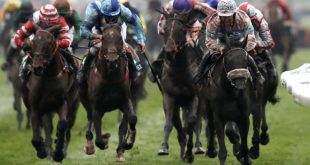The Betting and Gaming Council (BGC) has called on ministers to recognise the importance of the Grand National as a heritage sporting event supporting UK racing and highstreet jobs.
Following three years under lockdown constraints, The Grand National returns to hosting live spectators at Aintree on Saturday 9 April. Its main race is expected to be watched by a global audience of half-a-billion from 140 different countries.
Across the country, betting shops and other highstreet venues are predicting a ‘bumper event’ as the event returns to its full glory.
According to research conducted by the BGC, 13 million people in the UK will place a bet on the Grand National this Saturday, which could see approximately £250m being staked on the main race.
The popularity of the event equates to around 2.5% of all annual horse racing stakes, with almost half of all bets taken placed by punters in betting shops – ‘around 1,000 bets per shop’.
Further benefits see the Grand National generate £3m in direct tax revenues for the Treasury and a £2m generated for horseracing’s levy to support its stakeholders.
“Millions of us are going to come together this weekend, from all walks of life, to have a bet on the Grand National,” explained BGC’s CEO, Michael Dugher. “It is the nation’s punt, the one time many go and place a bet in their local bookies and enjoy the thrill of horse racing with friends and family.
“Its fantastic bookies are once again open on high streets, but there could be a sting in the tail next year if anti-gambling prohibitionists get their way.”
The 2022 Grand National will take place against the backdrop of the biggest shake-up of UK gambling laws, as BGC members await for the publication of the government’s White Paper recommendations reforming the 2005 Gambling Act.
The BGC and racing stakeholders have warned the government not to pursue “intrusive affordability checks and a ban on player promotions and offers”, measures that are supported by industry reformists.
Working with the industry, Dugher supports alternative solutions that will not undermine the consumer experience and erode competition in a thriving industry, measures the BGC has urged Ministers to resist.
The trade body maintains that intrusive checks will threaten the industry’s contribution to the economy, sport and ongoing work to promote safer gaming and embolden black market operators in which £5m is expected to be staked on the Grand National via unlicensed websites.
Dugher concluded: “Research shows punters would react badly to being asked to submit to instructive affordability checks, or curbs on their consumer experience, with any ban on promotions. One study found 95 per cent of punters would not share bank details in order to place a bet – while 86 per cent of punters feared checks like this would drive gambling underground.”
“We want to find workable solutions that protect vulnerable players, but blanket affordability checks would affect millions of punters, drive many to the black market, and suck up to £100m out of horseracing, jeopardising jobs and local economies.
“With the nation’s eyes on horse racing and betting this weekend, we want the Government to recognise the popularity of betting, its unique place in our national culture, and ensure they address punter’s concerns and protect jobs in the upcoming White Paper.”









